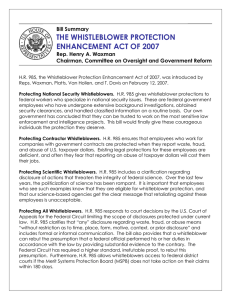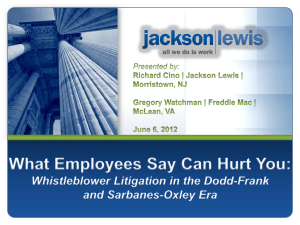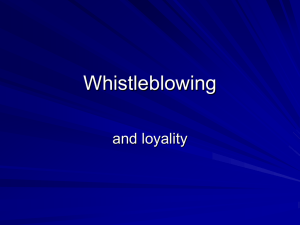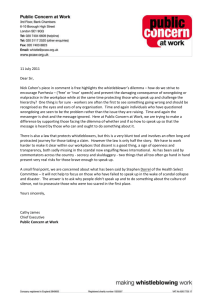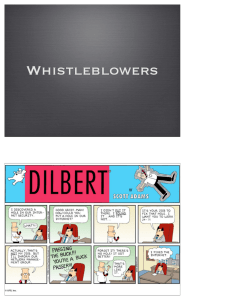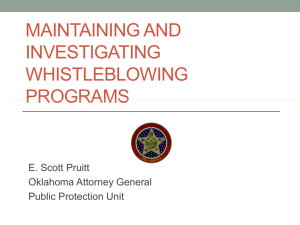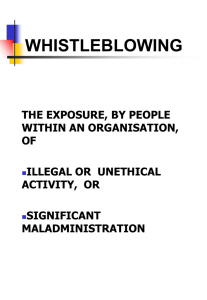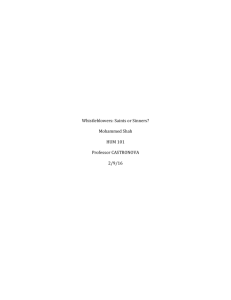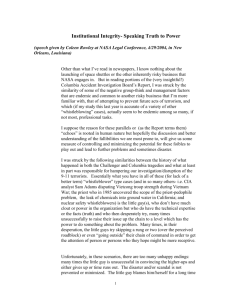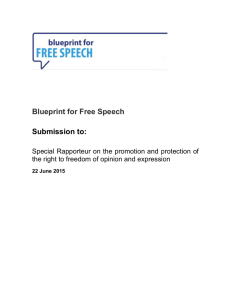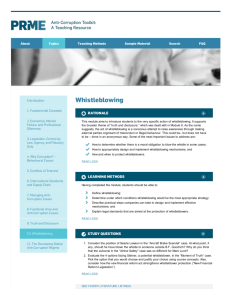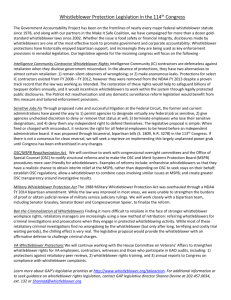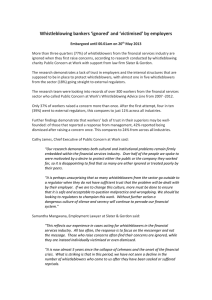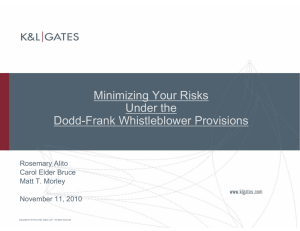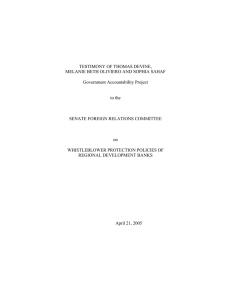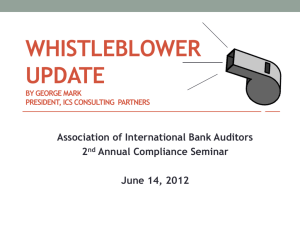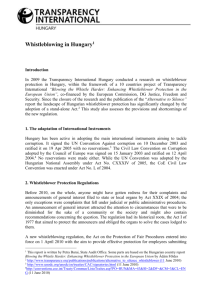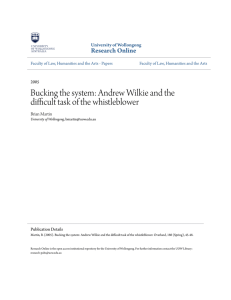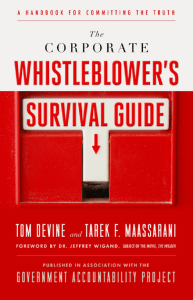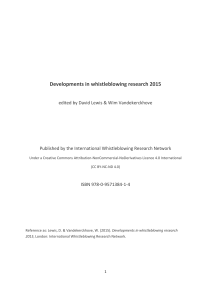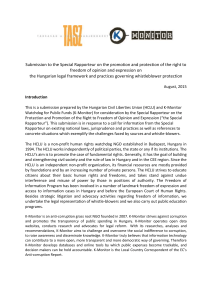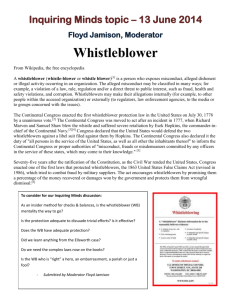Prevent the whistleblower from ending up as the victim.
advertisement
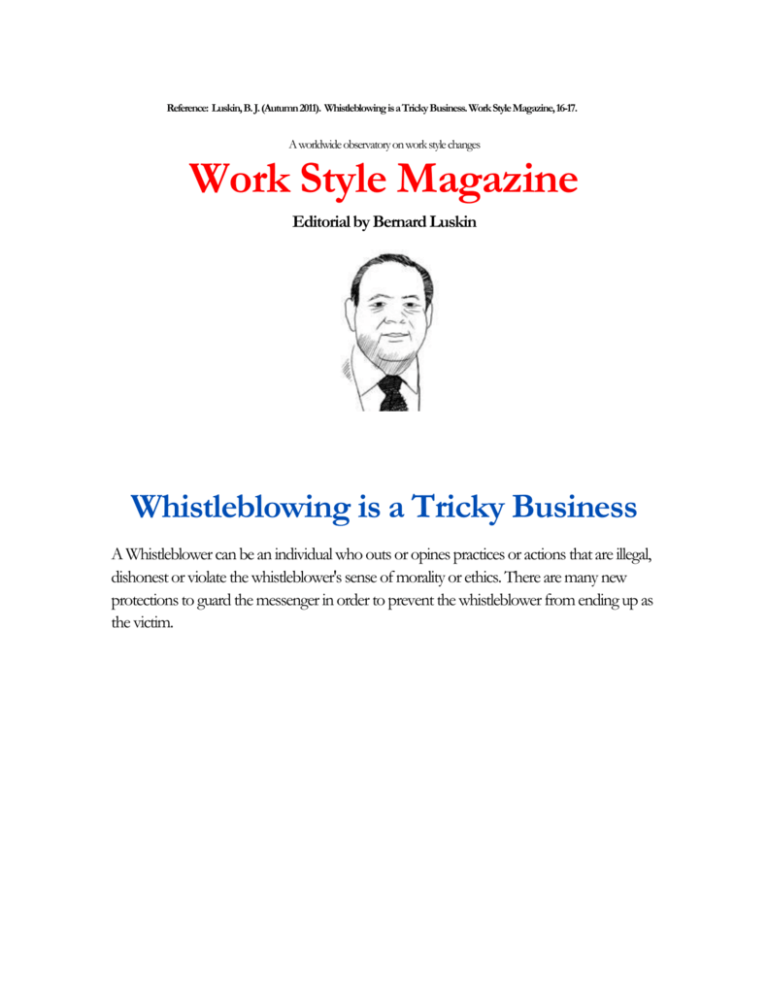
Reference: Luskin, B. J. (Autumn 2011). Whistleblowing is a Tricky Business. Work Style Magazine, 16-17. A worldwide observatory on work style changes Work Style Magazine Editorial by Bernard Luskin Whistleblowing is a Tricky Business A Whistleblower can be an individual who outs or opines practices or actions that are illegal, dishonest or violate the whistleblower's sense of morality or ethics. There are many new protections to guard the messenger in order to prevent the whistleblower from ending up as the victim. Illustration by Goñi Montes, Decatur, USA Whistleblowing is one of the most effective means used for continuously monitoring of individuals and to ensure that managers follow procedures. Whistleblowers In 1864, the US Congress passed the "False Claims Act" that was first signed into law by Abraham Lincoln during the Civil War. The act allowed an individual to file suit on behalf of the United States against anyone committing fraud impacting the federal government. This is an example of an early vehicle that provided a whistleblower some protection and encouraged them to report sensitive information. The record of many whistleblowers is reflected in the reporting of dishonest or fraudulent acts within their organizations or businesses. There are also people who blow the whistle on other individuals or organizations in which they do not work but are given incentives to report and expose illegal, dishonest or socially unacceptable acts. US Qui Tam rules also encourage whistleblowers to report issues while rewarding them with a percentage of money recovered by the government as an outcome of a legal case. WHAT PERSONALITY TYPE ENABLES A PERSON TO WILLINGLY REPORT A FELLOW EMPLOYEE, SUPERIOR, INDIVIDUAL OR GOVERNMENT AGENCY KNOWING THERE WILL BE CONSEQUENCES? Some people would call them courageous or even heroes in instances that uncover and expose an injustice. However, one risk is that a whistleblower may become a target for retaliation. So, there must be a genetic risk propensity in the brain wiring of the whistleblower. Included in the risk is the possibility of a negative stigma, such as "Tattletale." This possibility requires a willingness to confront adversity. Whistleblowers show up in the news often and capture our collective attention. Movies or news reports cover their lives. The most recent example is the independent movie The Whistleblower which is being released now and may be nominated for an Oscar. Other examples of famous public whistleblowers include Daniel Ellsberg and the Pentagon Papers, Jeffrey Wigand and the tobacco industry, Karen Silkwood and the nuclear industry, Cynthia Cooper and Sherron Watkins who exposed Enron2 and Julian Assange, the whistle-blower who created an organization and website called WikiLeaks, 3." The results are inconclusive at the moment and the motivation of the leakers are debatable. Julian Assange is a highly visible public figure and was the runner up for Time Magazine's Person of the Year with readers voting 1,249,425 times for the Australian-born self-proclaimed crusader of truth and reform4. He has a strong opinion of right and wrong and possesses the dedication to continue releasing controversial information. IS JULIAN ASSANGE A "WHISTLEBLOWER" OR IS HE A JOURNALIST WHO HAS CREATED A FORUM FOR WHISTLEBLOWERS? Assange has not personally blown the whistle, yet he has published confidential papers that others have obtained and have given to Assange for his publication. Is he a heroic figure, a shrewd business-man or a thrill seeking exhibitionist? He may be a Pied Piper of whistleblowing, a Rupert Murdoch of the new journalism or something else? Because of the controversial nature of Assange's case, it is hard to classify him with a standard whistleblower's psychological profile but I do list some general insights. My years as a psychotherapist lead me to offer the following information about the traits of a typical whistleblower: Whistleblowers: · are driven by altruism. · can overcome insecurity through exhibitionism in order to release information. · are generally moralistic, becoming committed and even obsessed about a personal belief. · have a propensity to rely on moral theories that emphasize rights. · are strong willed. · are stubbornly committed and uncompromising. · are willing to go against social conventions. · rely on their own attitudes and beliefs. · come from a mindset. In most cases, society determines the right and wrong of social issues. Illegal or criminal exposure takes whistleblowing to another level. However, in my experience, altruism, a personally defined morality, rigidity and strong will, a willingness to counter social conventions and rely on one's own beliefs, are the general characteristics of an individual with a propensity to expose controversial events and information. There are many lists of personality types that may apply. Some lists include an idealist, protector, visionary, enforcer, and dogooder. In the public arena, there have been a number of high profile whistleblowers in recent years and many share a number of the personality characteristics I have described. No doubt the psychological profile of a whistleblower captures the public's imagination and is helpful to know for both industry and government. It is therefore important to understand this personality regardless of a person's or institution's opinion on the action of whistleblowing itself. Touro University Worldwide online master's degrees include various disciplines and courses that investigate the psychology of whistleblowers and other psychological profiles, which impact Human Resource issues and business in general. ABOUT THE AUTHOR Bernard Luskin, EdD, LMFT, is CEO, Senior Provost and Professor of Marriage and Family Therapy at Touro University Worldwide (www.TouroW.edu). Dr. Luskin received the 2011 American Psychological Association Media Psychology Division Life Achievement Award for contributions to Media Psychology. He was Co-Director of the APA Task Force Report on Psychology and New Technologies and was founder of the first PhD program in Media Psychology in any university while serving as professor of psychology at Fielding Graduate University. Contact Dr. Luskin at Bernard.Luskin@TouroW.edu. Magazine Link: http://theworkstylemagazine.byway.it/nl/f.jsp5K.Jb.EET.h.P.vJfq TUW Link: http://www.TouroW.edu ###
